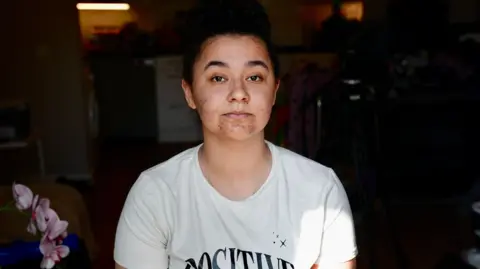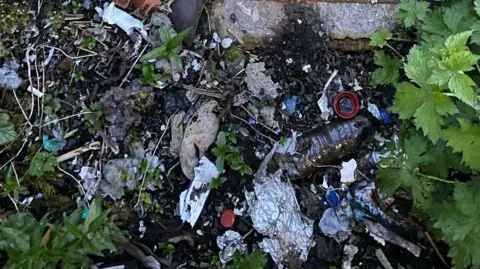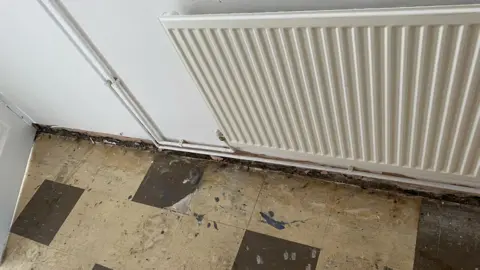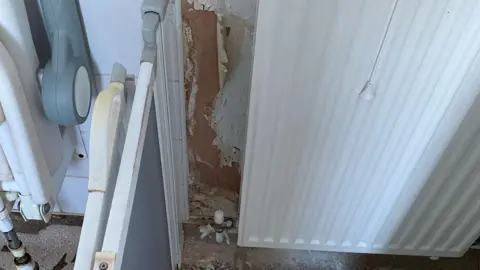No working toilets and zombie knives in 'vile' housing for kids
 BBC
BBCYoung people have said they were placed in dirty, dangerous and unsuitable accommodation in Wales as children.
One 15-year-old girl said it was "dehumanising" having to use the toilet in a local McDonald's for months because her own was broken, while one young woman said she saw someone being threatened with a "zombie" knife in a hostel.
There are now calls for a complete overhaul of housing and homelessness guidance for children, following a report released by the Children's Commissioner for Wales.
The Welsh government said it was committed to increasing and improving housing stock and consulting with stakeholders about setting standards for social landlords.
Amari, 21, has been homeless and lived in shelters and hostels, and said some of those places were "vile" and "unsafe".
"There was a lot of drug use and gun and knife violence, which was not ideal," she said.
"It almost seemed like you went from one awful situation to the next - from one violent situation to the next."
Amari, from south Wales, said she missed school and her GCSEs suffered because she was in such a "volatile" situation.
"My mental health was really bad," she said.
She described finding "rotting food in the fridge" and "bugs in the cupboards" when moving into one place, adding: "The carpet in the front room you could smell it, there was human waste on it.
"The whole room smelled of human waste - it was bad."
'Resident carried zombie knife'
Amari said in one hostel another resident sold drugs and carried a large "zombie killer" knife.
"It's a machete-style knife with lots of indents in the metal," Amari said.
Amari said she saw the knife held up to another resident's throat.
"It's when I decided I wasn't going to stay there," she said.
But Amari, a former international-standard dancer, said young people felt like they had to stay in such an environment to be able to secure their own home.
Amari has also been diagnosed with functional neurological disorder (FND) which affects the link between the brain and the body.
The condition, which can be caused by psychological stress and physical trauma, has left her with limb paralysis and she uses a wheelchair.
She believes the stress of her past accommodation has contributed to her illness.
"I think without all the additional stress of living in these places, this wouldn't have happened, that I would still be dancing - I would have actually been a functioning member of society," she said.
Amari said finding suitable accommodation was even harder because of her condition.
She has now been placed in a suitable flat and is an aspiring musician but believes the attitude towards young people is "just get on with it".
"Just get on with it includes violence, just get on with it includes living in squalor," she said.
 Contributor's own
Contributor's ownVulnerable young people across Wales have spoken about feeling unsafe in temporary accommodation which is dirty, dangerous and inadequate.
The Children's Commissioner for Wales has written a report which is the first of its kind to highlight housing and homelessness issues from a child's perspective.
A range of organisations provide accommodation in Wales, including housing associations, charities, councils, and private landlords.
'Three months with no toilet'
Emily, 15, and her mother had to move to flee domestic violence.
We have not used her real name to protect her identity.
Emily is a straight-A student who aspires to study at Oxford University but said she did not feel safe in some accommodation.
"We were fleeing domestic violence - the housing we moved into was shocking. We had a bathroom that would flood the corridor and the kitchen, and it had a cracked window, so we had no security," she said.
"Then the toilet in the bathroom broke so we had three months without a toilet, which is why we had to drive to McDonald's to use the toilet, or I had to use the toilet at school - it was dehumanising."
 UGC
UGCEmily said when they first moved in, the front door did not lock.
"I just felt so low all the time, I felt unsafe," she said.
"It destroyed my self-esteem, I couldn't see my friends, I couldn't have my friends around."
Emily and her mother have since moved but she said there was mould on the walls and damp in the house.
"Since I've lived here I've been to hospital multiple times because I've had difficulty breathing - it's definitely affected my health."
Emily said she cannot invite friends over or decorate her bedroom because of the mould.
"I'm doing my GCSE's and can't revise properly," she said.
She added: "I just want a safe home."
 Contributor's own
Contributor's ownAccording to the latest Welsh government statistics, 27% of all households placed in temporary accommodation between April 2023 and March 2024 were families with children.
Children as young as 10 told Children's Commissioner for Wales Rocio Cifuentes they lived in accommodation where their bedroom roof leaked at night.
Other children said damp and mould were affecting their health, while one child in private rented accommodation said faulty wiring meant they could not plug in devices.
One Year 6 pupil said windows were "falling out" of her damp home and there was no heating.
Ms Cifuentes has now called for an overhaul of housing and homelessness guidance in Wales to strengthen children's rights.
She said there was an existing legal duty on Welsh government and ministers to consider children's rights in all of its decision-making, but that duty "isn't filtering down effectively to provision on the ground - there's a weakness there currently".
"Welsh government must review all of its housing and homelessness guidance to ensure there are specific requirements relating to children's rights under the United Nations Convention on the Rights of the Child," she added.
The commissioner has also called on Welsh councils to do more to consider children's rights when decisions are made about housing families.
Andrea Lewis, Welsh Local Government Association (WLGA) spokesperson for housing, said housing and homelessness were "some of the most urgent challenges facing local government".
"Councils are working incredibly hard to support families, but they are doing so under immense financial pressure and with rising demand for services," Ms Lewis said.
She added the WLGA was working with the Welsh government to look at long-term plans to reduce the number of people experiencing homelessness and living in temporary accommodation.
A Welsh Government spokesperson said it was committed to increasing and improving housing stock in Wales.
"Our Welsh Housing Quality Standard (2023) sets out bold and progressive standards for social housing in Wales, including that homes must be free of damp, to be met over the next 10 years," they said.
"We are also consulting key stakeholders about setting standards for social landlords' response to damp, mould and other hazards which may have serious health consequences."
